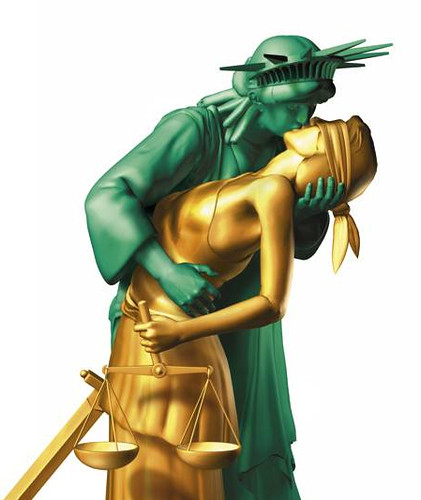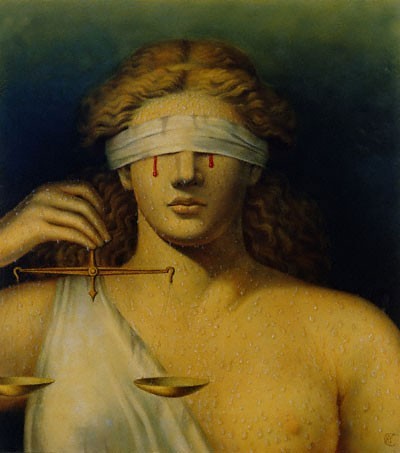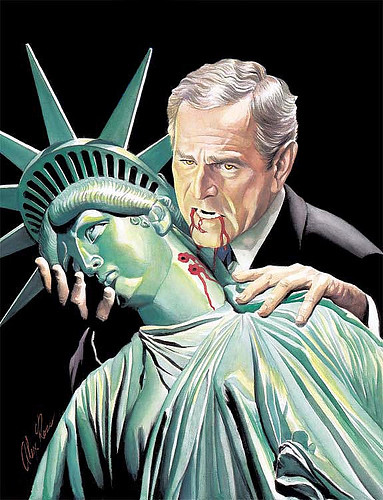On YouTube I found an excerpt from a Coversation between Cornel West and Toni Morrisson which touched on the political implications of Mel Gibson's Passion (among other things). I was also able to find a fuller transcript of the conversation from The Nation's website under the title Blues, Love and Politics. The aspect which I found most intriguing is the distinction West makes between being a "Prophetic Christian" and a "Constantinian Christian" and it made me wonder about whether a similar distinction could be applied to Islam.
So does this distinction play itself out in Islam? If so, how are the lines drawn?
Some might be tempted to say that the so-called Progressive Muslims are perhaps the analogue of West's "Prophetic Christian" but ironically, a number of those who use this label (like Irshad Manji for instance) are only liberal when it comes to religious issues but are neocons in terms of their politics. And conversely, in the egalitarian face of islamic orthodoxy we have already seen some indication of how orthodox Islam is actually rather progressive, at least in terms of the economic aspects of social justice.
Some might be tempted to say that Sunni Islam is the "Imperial" Islam while Shiism is more the Islam of the persecuted powerless minority. But that would be a little bit too simple.
For example, for a while now I've been meaning to elaborate on the fact that each of the four great imams who established the foundations for orthodox Sunni law had spent some time in prison or otherwise punished by for principled disobedience to the state of their day.
And conversely, within Shiism, Ali Shariati makes the distinction between Red Shi'ism (the religion of martyrdom) vs. Black Shi'ism (the religion of mourning) each with their own attitudes towards monarchy and clerical power. Some Shias focus on Imam Hussein's noble sacrifices in the interests of justice while others, in a Gibson-esque way, choose to emphasize the blood and gore.
I feel like something more detailed should be said, but I think I'll just end up repeating a point I already tried to make clear in ideology and temperament; namely that if some Muslims have a greater concern for social justice than others, they will not be identified merely by ideological labels ("progresive" , "orthodox", "shia" etc.) but on the existential decisions individuals make in their everyday lives.
Other Grenada:
islam needs radicals
sushi revisited: part one
ali shariati
MORRISON: [reading] "I am curious about the language of religion, which has become more pronounced in this Administration. Can you comment on the manipulation of religious belief and language for violent ends?"
WEST: That's one of the most dangerous features of our moment, there's no doubt about that. We live in a society in which 96 percent of our fellow citizens believe in God, and 72 percent believe Jesus Christ is the Son of God, 71 percent believe that the Book of Revelation has an empirically verifiable potential and 71 percent believe in angels. I don't put that down, I'm a Christian myself, but I'm a different kind of Christian than a lot of these Christians.
[...]
WEST: [...] the other side of this thing is that here we are, living in the biggest empire since the Roman Empire. Now the underside of the Roman Empire is the cross; that's why political prisoners were put to death, those who had the courage to act against the powers that be. We're the legatees of Constantinian Christianity, after Christianity was incorporated into the Roman Empire and was the official religion of the Roman Empire, which went on persecuting Jews and others.
Now, you see, I'm a prophetic Christian, I'm not a Constantinian Christian. That's very important. Because I want to raise the question, well, if you're going to talk about Jesus, did you really talk about the empire that put him to death and what the connection is between that empire and the empire that we're a part of now, and what Jesus demands of us in this empire given what he was willing to sacrifice in his own imperial moment? And I say now, Gibson, what have you got to say? But, he says, no, I'm going to give you sadomasochistic voyeurism.
So does this distinction play itself out in Islam? If so, how are the lines drawn?
Some might be tempted to say that the so-called Progressive Muslims are perhaps the analogue of West's "Prophetic Christian" but ironically, a number of those who use this label (like Irshad Manji for instance) are only liberal when it comes to religious issues but are neocons in terms of their politics. And conversely, in the egalitarian face of islamic orthodoxy we have already seen some indication of how orthodox Islam is actually rather progressive, at least in terms of the economic aspects of social justice.
Some might be tempted to say that Sunni Islam is the "Imperial" Islam while Shiism is more the Islam of the persecuted powerless minority. But that would be a little bit too simple.
For example, for a while now I've been meaning to elaborate on the fact that each of the four great imams who established the foundations for orthodox Sunni law had spent some time in prison or otherwise punished by for principled disobedience to the state of their day.
And conversely, within Shiism, Ali Shariati makes the distinction between Red Shi'ism (the religion of martyrdom) vs. Black Shi'ism (the religion of mourning) each with their own attitudes towards monarchy and clerical power. Some Shias focus on Imam Hussein's noble sacrifices in the interests of justice while others, in a Gibson-esque way, choose to emphasize the blood and gore.
I feel like something more detailed should be said, but I think I'll just end up repeating a point I already tried to make clear in ideology and temperament; namely that if some Muslims have a greater concern for social justice than others, they will not be identified merely by ideological labels ("progresive" , "orthodox", "shia" etc.) but on the existential decisions individuals make in their everyday lives.
Other Grenada:
islam needs radicals
sushi revisited: part one
ali shariati


